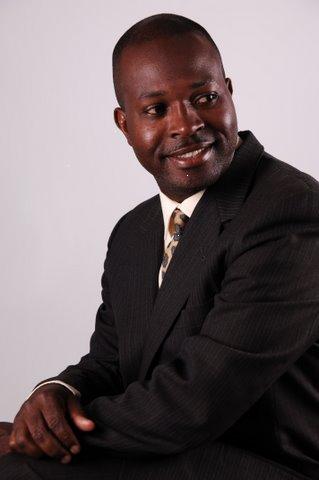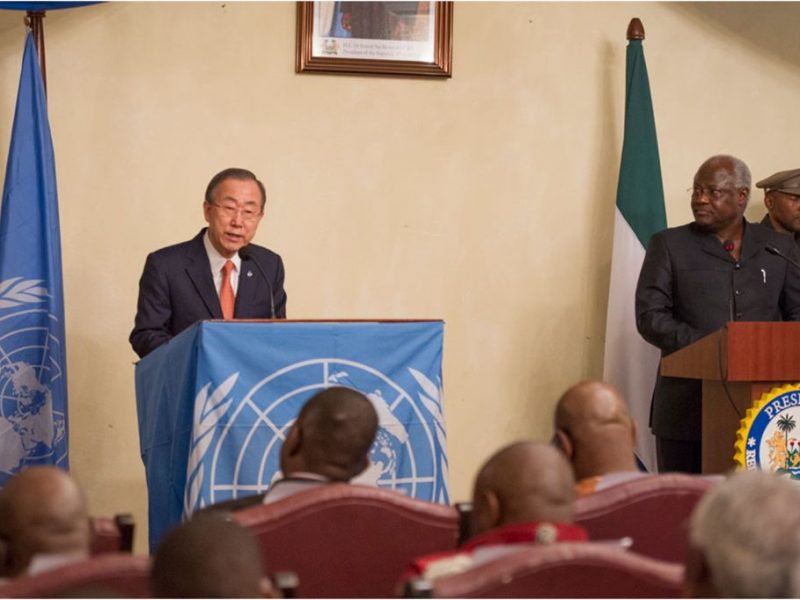Factsheet: the United Nations in Sierra Leone
Background – Over fifteen years of successive peace operations in Sierra Leone will end 31st March, 2014 when the United Nations Integrated Peace Building Office in Sierra Leone (UNIPSIL) will close down as per United Nations Security Council Resolution (2097) of March 2013.
In his statement to the plenary of the General Assembly in January 2014, the United Nations Secretary-General commended the withdrawal of UNIPSIL as a sign of “how far the country has come and the value of sustained efforts to keep, consolidate and build peace.”
Impact
UNIPSIL has helped Sierra Leone to consolidate peace by easing tensions that could have caused a relapse into conflict, while strengthening institutions and promoting human rights. The Mission assisted in the restoration of state authorities, the National Electoral Commission and the Judiciary. Its support to the Police helped establish the first Transnational Organized Unit in West Africa and create an Independent Police Complaints Board. UNIPSIL also helped establish the Sierra Leone Broadcasting Corporation, the second independent broadcasting corporation in Africa. It also strengthened Sierra Leone’s National Human Rights Commission which received an award for compliance with international standards.
Timeline
Following are some of the key milestones in the closure of UNIPSIL and transition to a development-focused United Nations system:
- March 2013-UN Security Council Resolution 2097 renewed UNIPSIL’s mandate for 12 months and determined that the mission “should be fully drawn down by 31 March, 2014.
- April 2013-UNIPSIL closed its office in Kenema
- June 2013-UNIPSIL’s Democratic Institutions Section completed its work.
- September 2013-Handover of UNIPSIL’s Regional Officer in Koidu to UNDP/UN Family
- November 2013-UNIPSIL’s Political and Peace Consolidation Section completed its work on the Non-State Actors project, which was supported by the peace building fund
- December 2013-closing of UNIPSIL’s offices in Bo; transfer of Makeni office to UNICEF/UN Family
- UNIPSIL’s Human Rights Section completed its work
- February 2014-40 UNIPSIL personnel are left
The UN Country Team is finalizing the United Nations Development Assistance Framework (UNDAF), its future development strategy for 2015-2018, including forward looking recommendations from the Transitional Joint Vision (2013-2014) Mid Term review.
UNIPSIL continues providing support to the constitutional review process, including by building the capacity of key national stakeholders.
- March 2014-The UN Secretary-General visits Sierra Leone to close the mission and submit his final report on Sierra Leone to the Security Council
- 26 March-final Security Council briefing in Sierra Leone
- March 31-final closure of UNIPSIL
Second Quarter
A UN Resident Representative/Resident Coordinator will replace the Executive Representative of the Secretary-General as head of the United Nations Country Team
Handing over
This transition from peace building and peace consolidation to development also marks a new phase of UN assistance in the country. The United Nations Family in Sierra Leone will continue and even expand some of UNIPSIL’s responsibilities, for example, support to the government in the constitutional review process, as well as strengthening human rights, Police, justice institutions and engagement with the media sector.
The UN Family in Sierra Leone
The UN Country Team (UNCT) in Sierra Leone currently consists of 19 agencies, funds and programmes and a total of about 600 staff. The work of the UNCT goes far beyond the expiring mandate of UNIPSIL and will continue after the mission closes. The UN is changing its size and shape to better support the Government’s Agenda for prosperity as Sierra Leone moves farther away from a troubled past and closer to its aspirations for a prosperous future.
The Transitional Joint Vision (TJV) is a set of UN programmes which lays out the collective strategy for the UN, aligned with selected priorities established in the Government’s Agenda for prosperity. Thanks to the generosity of donors, seventy-seven percent of the funds requested for the 2013-2014 programme cycle, are already available ($176.8 million out of a total of US$230 million). An advanced draft of the United Nations Development Assistance Framework (UNDAF), the successor strategy to the TJV for 2015-2018, for which the UN and Government are working on drafting together, is on schedule to be finalized by end of March 2014. Funding requirements for the four year programme total some $525 million, or roughly $131 million per year.
Stay with Sierra Express Media, for your trusted place in news!
© 2014, https:. All rights reserved.





